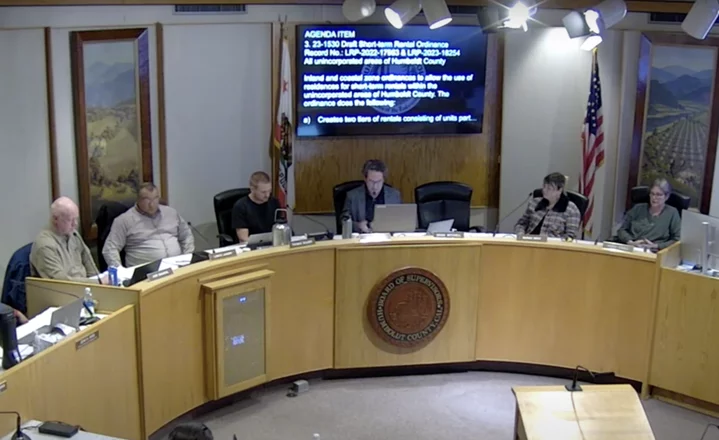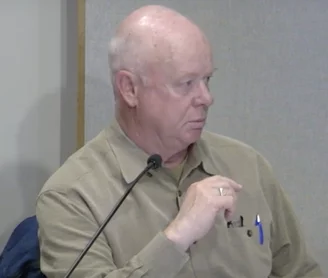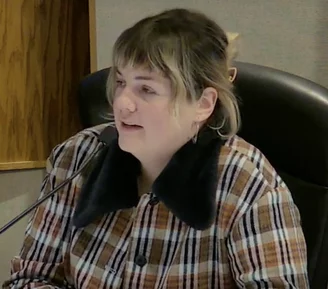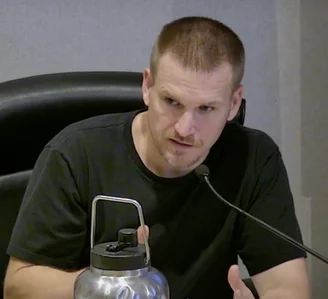Screenshot of Thursday’s Humboldt County Planning Commission meeting.
###
The Humboldt County Planning Commission on Thursday unanimously approved new guidelines for short-term vacation rentals operating in unincorporated areas of the county.
The new rules, which have been in the works for several months, provide a regulatory framework for short-term rentals (dwelling units that are rented to guests for 30 consecutive days or less, through services such as Airbnb or Vrbo) to prevent adverse impacts on the local housing stock and neighborhood character. Of the 34,093 residential units in unincorporated Humboldt County, approximately 567, or 1.66 percent, are currently being used as short-term rentals.
Once the ordinance is approved by the Humboldt County Board of Supervisors, likely in the next month or so, property owners operating short-term rentals in unincorporated Humboldt will be required to go through a permitting process. Existing operators – anyone who has operated a short-term rental prior to the effective date of the ordinance, which has yet to be determined – without unresolved property violations will be given first priority.
During the Planning Commission’s final review of the draft document on Thursday evening, commissioners once again wrestled over how many short-term rentals should be allowed to operate in a given area. At an earlier meeting, the commission had agreed to a two percent cap on short-term rentals in the Humboldt Bay region, where housing is already scarce.
Commissioner Iver Skavdal thought it would be a good idea to extend the two percent cap to some of the county’s “over-impacted” Community Plan Areas, including Trinidad and Westhaven, where short-term rentals comprise between six and eight percent of the total housing stock.
“There’s still a little bit of room between the number of short-term rentals that we have and the two percent [cap], and if all that balance just happened to show up in Trinidad or Westhaven – which is already an overly impacted area – it would seem to be unfair to that part of the community,” he said. “I’m trying to find a way to set another limit so those Community Plan Areas never get over a certain amount, or just hold at their current amount.”
Commissioner Peggy O’Neil agreed, adding that she would like to see short-term rentals “more distributed [throughout the county] to give more opportunity” to operators looking to supplement their income without overwhelming a specific area.
Commission Chair Noah Levy was a little more hesitant, noting that the “overall purpose of the cap was to ensure housing was available in places where people most need it in the Humboldt Bay Area.”
“If we essentially freeze the ability for any new, short-term rentals to occur in the places where they’re currently most popular – i.e. Trinidad, Westhaven or Orick – we end up putting more pressure on the communities that have, to this point, been less impacted in terms of the density of these rentals,” he said. “It’s true that having six or eight percent is impactful in Orick or Westhaven … but I guess I see those as being less critical regions for most people in the Humboldt Bay Area to live or find housing.”
Commissioner Sarah West noted that the commission had received comments from several people living in those communities. “They have voiced that they are feeling the impact when they look for housing in those areas,” she said.
Commissioner Lonyx Landry added that housing had become less and less affordable near Orick with the proliferation of short-term rentals in the area due to the community’s proximity to Redwood National and State Parks.
After a bit of additional discussion, the commission ultimately agreed to a five percent cap on short-term rentals in Community Plan Areas, with the exception of the inland portion of Shelter Cove “where the standard does not apply” due to specific zoning rules.
Commissioners also wrestled with the issue of transferability and whether a short-term rental operator should be allowed to transfer their permit to another individual, particularly to children or next of kin, in the event of the operator’s death.
Cade McNamara, a planner with the county’s Planning and Building Department, recommended that the commission make the permits non-transferable to avoid conflict. “We get into kind of a sticky situation when we try to limit what can and cannot be transferred legally,” he said.
Planning and Building Director John Ford added, “Basically, this is a choice between not allowing transfers or allowing transfers that go well beyond children.”
Commissioner Thomas Mulder advocated for transfer of ownership, emphasizing the importance of being able “to pass things down to your children.”
West disagreed. “I just don’t think this is an appropriate avenue to do it,” she said. “As soon as you open up the door to make this pass down you are commodifying it, you’re conferring value … on making a home a commercial use. And I don’t agree with that.”
Skavdal said he had “flip-flopped all over” the transferability issue, but was reluctant to support it. “I have a short-term rental next door to my house, it can be there for generations and generations and it will just remain a short-term rental. I’m not sure I’m in favor of that.”
Mulder suggested that staff put a time limit on transfers to avoid having short-term rentals around long term as Skavdal feared. The commission entertained the idea but ultimately felt it was too complicated and decided to vote on the matter.
West made a motion to approve staff’s current recommendation not to allow transfers, which was seconded by Skavdal. The motion passed 4-2, with Levy and Mulder dissenting and Commissioner Brian Mitchell absent.
The commissioner went over a few smaller points but did not make any additional changes to the draft ordinance.
Mulder acknowledged the importance of being able to “agree to disagree and respect each other’s difference” and made a motion to adopt the ordinance as is, which was seconded by Landry.
The motion passed unanimously.
###
Previously:




CLICK TO MANAGE